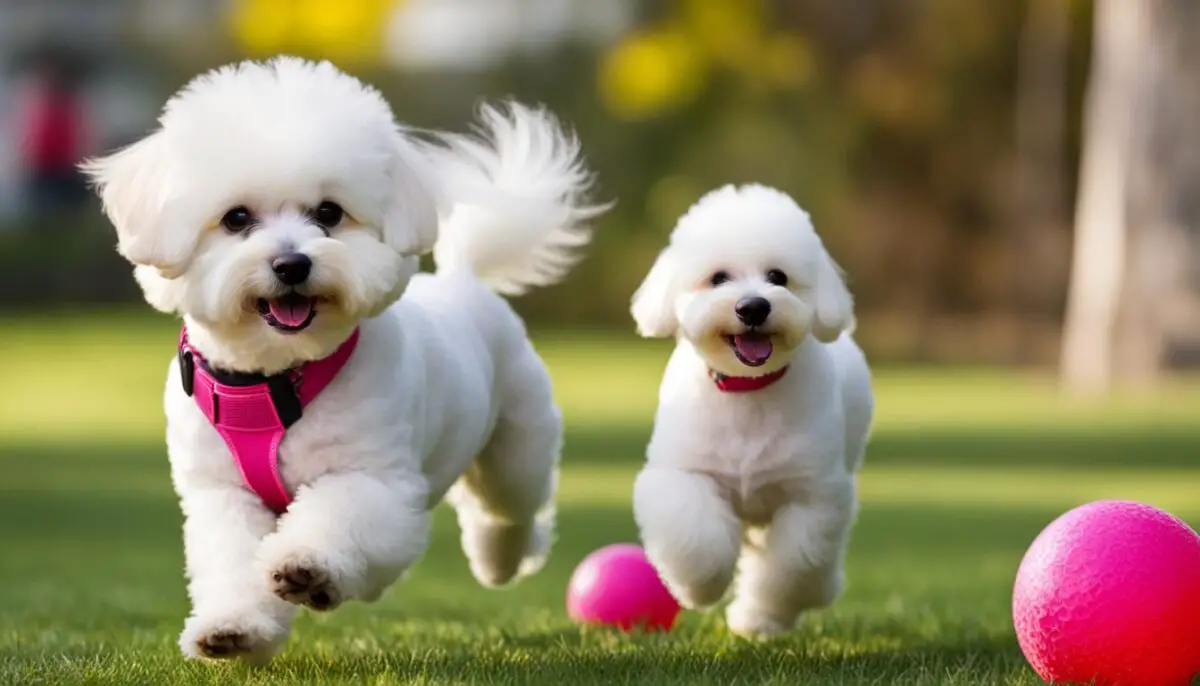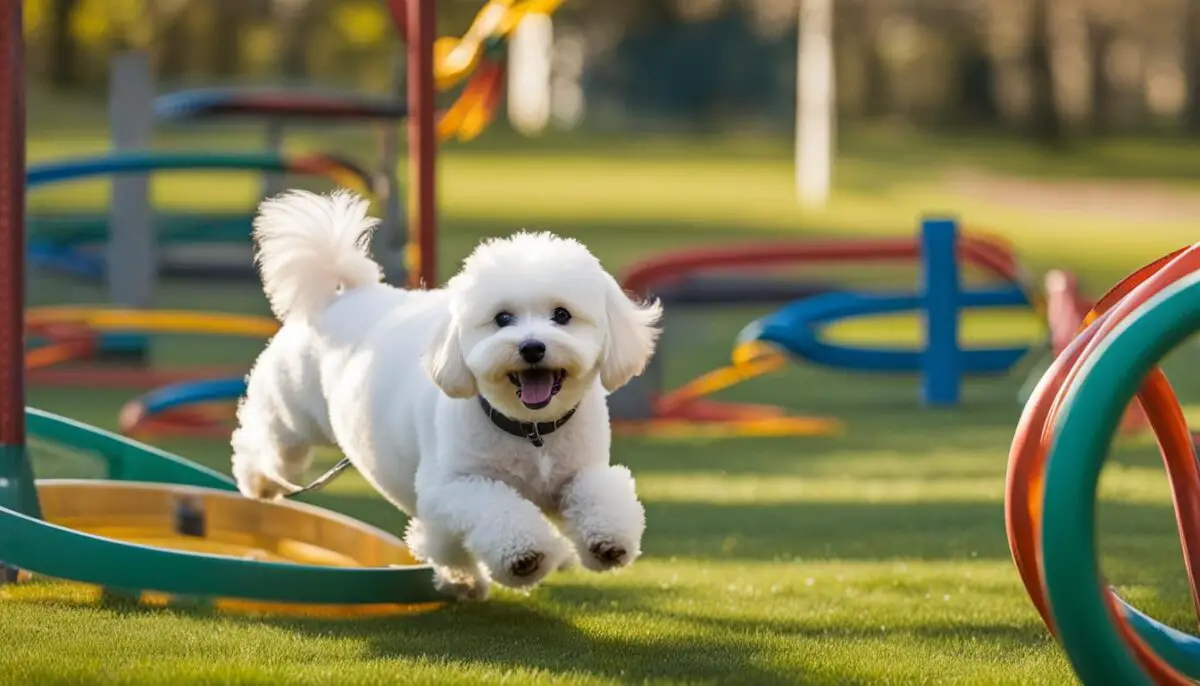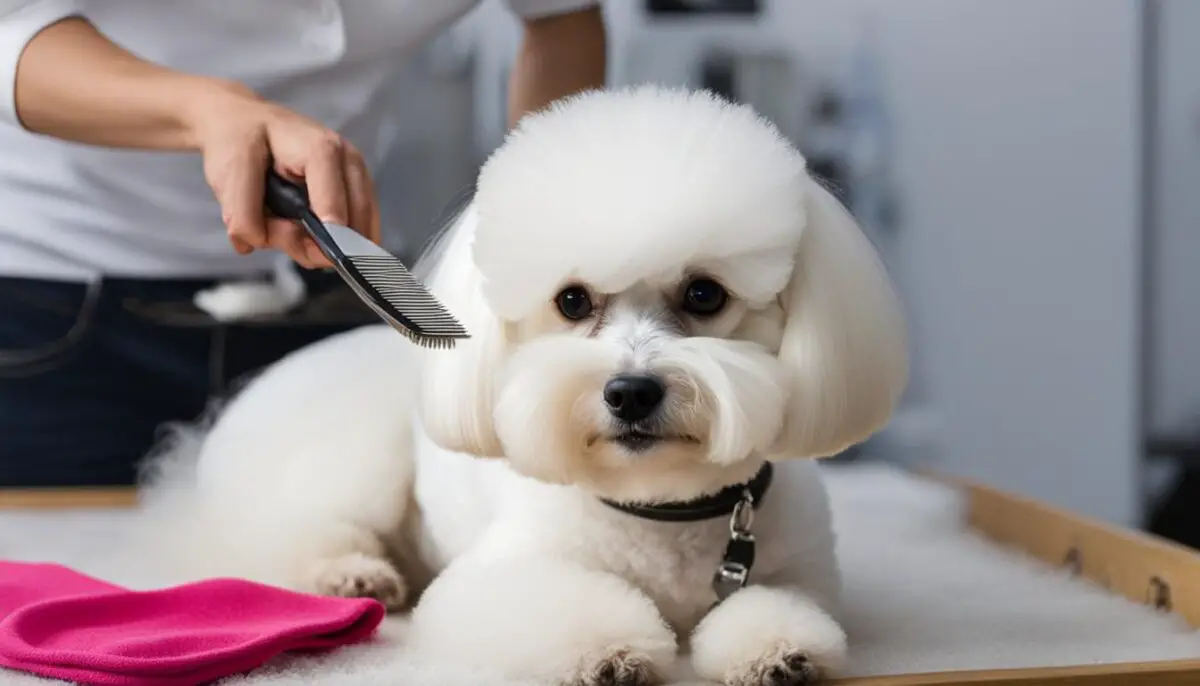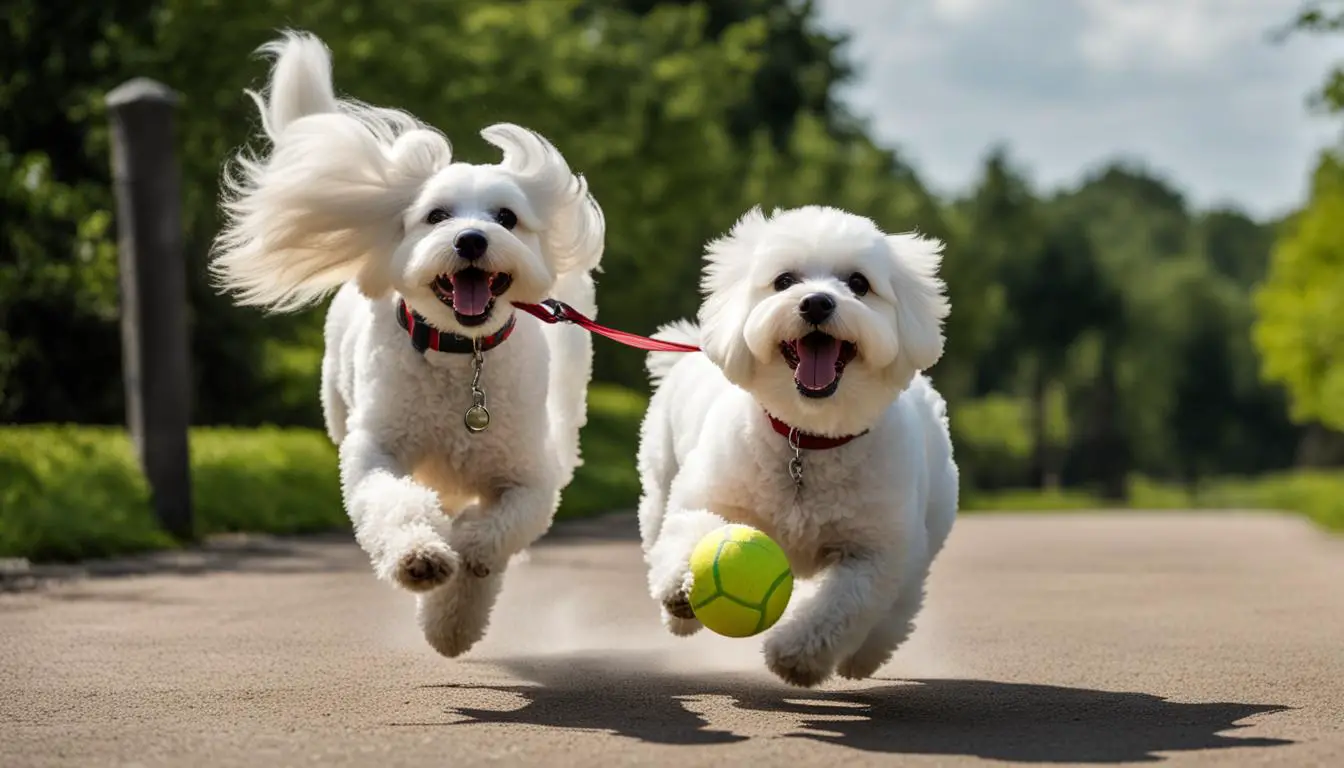The Bichon Frise is a small breed that requires a moderate amount of exercise. In order to keep your Bichon happy and healthy, it is important to provide them with the right amount of physical activity. But how much exercise do Bichons actually need? Let’s find out!
Key Takeaways:
- Bichon Frises require around 30 minutes to 1 hour of exercise per day.
- Daily walks, playtime, and interactive games are great ways to meet their exercise needs.
- Gradually increase exercise duration and intensity as Bichons age.
- Avoid excessive exercise for Bichon puppies, as it can be harmful to their growing bodies.
- Providing mental stimulation in addition to physical exercise is important for Bichon’s overall well-being.
How much exercise does a Bichon need?
Games and activities for mental stimulation
Bichon Frises have active brains and enjoy games and activities that provide mental stimulation. These games not only keep them mentally sharp but also help in keeping them active and healthy. Here are some exercise tips for Bichon Frise:
- Hide and seek: This game engages their sense of smell and provides mental stimulation. Hide their favorite toy or treat and let them find it. This game can be played both indoors and outdoors, making it a versatile option for mental exercise.
- Fetch: Playing fetch with a smaller-sized ball is a great way to exercise and mentally stimulate your Bichon. Their small size makes it easy for them to chase and retrieve the ball, providing both physical activity and mental engagement.
- Interactive puzzle toys: Bichons love solving puzzles, and interactive puzzle toys are a perfect way to challenge their minds. These toys usually involve hiding treats or toys inside compartments that the dog has to figure out how to access. This keeps them entertained and mentally engaged for extended periods.
Integrating these games into your Bichon’s exercise routine is an excellent way to keep them active and mentally stimulated. Remember to always supervise playtime and choose toys that are safe for your dog to play with. Mental stimulation is just as important as physical exercise for overall well-being, so make sure to provide opportunities for both in your Bichon’s daily routine.How much exercise does a Bichon need?
Keeping Bichons active and healthy
Ideal Exercise Duration for Bichon Puppies
Bichon Frise puppies have specific exercise needs that differ from adult dogs. It’s crucial to provide them with an appropriate amount of exercise to support their development while avoiding any potential harm to their growing bodies and joints. When it comes to Bichon puppy exercise, moderation is key.Bichon exercise requirements
During the early stages of their growth, Bichon puppies should engage in shorter play sessions throughout the day. It’s important to gradually increase the duration and intensity of exercise as they age. However, it’s essential to avoid long walks or intense exercise until they have fully developed, usually around 12 to 18 months of age.
To determine the ideal exercise duration and intensity for Bichon puppies, it’s highly recommended to consult with a veterinarian. They can provide personalized guidance based on your puppy’s age, size, and overall health. By following their advice, you can ensure that your Bichon puppy receives the appropriate amount of exercise to support their growth and well-being.Best exercise routine for Bichon dogs
| Age | Ideal Exercise Duration |
|---|---|
| 8-12 Weeks | 5-10 minutes 3-4 times a day |
| 3-6 Months | 15-30 minutes 2-3 times a day |
| 6-12 Months | 30 minutes-1 hour 1-2 times a day |
Remember, every Bichon puppy is unique, and their exercise needs may vary. It’s crucial to pay attention to their individual energy levels and adjust the exercise duration and intensity accordingly. By providing adequate exercise and consulting with your veterinarian, you can ensure that your Bichon puppy grows up healthy and happy.Ideal Bichon exercise duration
Exercise guidelines for senior Bichons
As Bichons age, their exercise needs may decrease. It’s important to let senior dogs set the pace during walks and monitor their energy levels. Some senior Bichons may slow down and may require shorter or slower walks. It’s important to provide them with appropriate exercise that meets their individual needs. The PitPat Dog GPS Tracker can help monitor their daily activity levels and adapt their exercise goals accordingly.
The PitPat Dog GPS Tracker is a useful tool for monitoring a Bichon’s exercise levels. With its real-time updates on running, walking, playing, and pottering around the house, it takes the guesswork out of monitoring a senior Bichon’s exercise. By tracking their daily activity, you can ensure that they are getting enough physical exercise while also providing mental stimulation. The PitPat Dog GPS Tracker can also assist in finding them if they wander during walks, giving you peace of mind and keeping your senior Bichon safe.
Senior Bichons may have specific health conditions or limitations that require modified exercise routines. It’s important to consult with a veterinarian to determine the optimal exercise levels for your senior Bichon. Your vet can provide guidance on the appropriate duration, intensity, and types of exercise that are best suited for your senior Bichon’s health and well-being. By following these exercise guidelines and incorporating the use of the PitPat Dog GPS Tracker, you can ensure that your senior Bichon remains active, healthy, and happy throughout their golden years.keeping bichons active and healthy
Games to keep Bichons entertained
Bichon Frises are playful, energetic dogs that love to be entertained. Engaging them in games can provide both physical exercise and mental stimulation. Here are some fun games that will keep your Bichon Frise entertained:
Tug of War
Playing tug of war with your Bichon Frise can be a great way to bond and provide physical exercise. Use a rope toy or a sturdy plush toy and engage in a gentle tug of war. Make sure to always let your dog win a few times to keep the game fun and exciting.
Treat-Filled Toys
Interactive treat-filled toys, such as Kong toys, are a fantastic way to keep your Bichon Frise entertained and mentally stimulated. Fill the toy with treats or peanut butter, and watch as your dog tries to figure out how to get to the delicious reward. This game will keep them engaged and entertained for hours.
Scent Games
Bichon Frises have a keen sense of smell, so playing scent games can be a lot of fun for them. Hide treats or their favorite toy around the house or in the yard, and let them use their nose to find them. This game provides mental stimulation and taps into their natural instincts.
Hide and Seek
Playing hide and seek with your Bichon Frise is not only entertaining but also engages their sense of smell. Start by having your dog stay in one area while you hide somewhere in the house. Call their name and let them find you. Reward them with treats or praise when they successfully find you. This game is a great way to keep them mentally stimulated and provide a fun bonding experience. optimal exercise levels for bichon pets
Remember to choose games that are appropriate for your Bichon Frise’s age and physical abilities. Always supervise playtime and ensure a safe and secure environment. These games will not only provide exercise but also strengthen the bond between you and your Bichon Frise, making them happier and healthier companions.
Monitoring Bichon Exercise Levels
Keeping track of your Bichon’s exercise is important to ensure they are getting enough physical activity for their overall well-being. One useful tool for monitoring their exercise levels is the PitPat Dog GPS Tracker. This innovative device provides real-time updates on their daily activity, including running, walking, playing, and even pottering around the house.
The PitPat Dog GPS Tracker can help you determine if your Bichon is getting enough exercise and mental stimulation. By monitoring their activity levels, you can adjust their exercise goals accordingly. This device takes the guesswork out of tracking their exercise, allowing you to focus on spending quality time with your furry companion.
With the PitPat Dog GPS Tracker, you can also ensure the safety of your Bichon during walks. If they ever wander off or get lost, the tracker can assist in locating them quickly and easily. This provides peace of mind and helps to keep your Bichon safe during outdoor activities.
| Benefits of the PitPat Dog GPS Tracker |
|---|
| Real-time updates on daily activity levels |
| Adjust exercise goals based on their activity |
| Track their location during walks |
| Ensure their safety and well-being |
The PitPat Dog GPS Tracker is a valuable tool for any Bichon owner who wants to make sure their furry friend is getting enough exercise and staying safe. With its user-friendly features and accurate tracking capabilities, you can easily monitor their activity levels and adjust their exercise routine as needed.

Bichon Frise Dietary Needs
The Bichon Frise is a breed that requires a balanced diet to support their overall health and well-being. Providing them with the right nutrients, vitamins, and minerals is essential for their growth and development. Here are some key considerations for meeting their nutritional requirements:
Dog Food:
Feeding your Bichon Frise with a high-quality, complete dog food that is specially formulated for small breeds is recommended. Look for a product that provides a balanced ratio of proteins, carbohydrates, and fats to meet their energy needs. It’s important to read the label and ensure that the food does not contain any artificial additives or fillers. Consult with your veterinarian to determine the appropriate portion size for your Bichon, taking into account their age, activity level, and metabolism.
Meal Frequency:
Bichon Frise puppies may prefer to have smaller, more frequent meals throughout the day to support their growth and maintain stable blood sugar levels. As they transition into adulthood, they can be fed twice a day. However, it’s important to monitor their weight and adjust the portion sizes accordingly to prevent overfeeding and weight gain.
Hydration:
Providing access to fresh, clean water at all times is crucial for Bichon Frises. They should have access to water both during and in between meals. Regular hydration is essential for their overall health and helps maintain proper digestion.
| Nutrients | Importance | Sources |
|---|---|---|
| Protein | Supports muscle development and repair | Quality animal-based protein sources such as chicken, turkey, and fish |
| Carbohydrates | Provides energy | Whole grains, fruits, and vegetables |
| Fats | Essential for coat and skin health | Healthy sources such as fish oil and flaxseed |
| Vitamins and Minerals | Support overall health and immune function | Fruits, vegetables, and supplements if recommended by a veterinarian |
It’s important to note that Bichon Frises may have specific dietary requirements based on their individual needs and any underlying health conditions. Consulting with a veterinarian is always recommended to ensure that your Bichon Frise is receiving the proper nutrition for their specific needs.
Bichon Frise Training Tips
Training a Bichon Frise can be a rewarding and enjoyable experience for both you and your furry friend. These intelligent and fast learners respond well to positive reinforcement techniques, such as treats and praise. Consistency and patience are key to successful training sessions.
Start training your Bichon Frise from a young age to establish good behavior patterns. Socialization is also important for Bichons, so consider enrolling them in puppy socialization classes. These classes provide an opportunity for your Bichon to interact with other dogs and humans, helping them develop good social skills.
“Consistency and patience are key to successful Bichon Frise training sessions.”
Bichon Frises are social dogs that enjoy human interaction. They thrive when they have a strong bond with their owners, so make sure to spend quality time together. Engaging and interactive training sessions will help keep your Bichon’s interest and make training more effective.
Remember to keep training sessions short and engaging to prevent your Bichon from getting bored. Break the training into small, manageable tasks and reward them with treats and praise for their progress. Consistency and positive reinforcement will help your Bichon Frise become a well-behaved and obedient companion.

Bichon Frise Training Tips in Summary:
- Start training from a young age to establish good behavior patterns.
- Use positive reinforcement techniques, such as treats and praise.
- Consider enrolling your Bichon in puppy socialization classes for socialization.
- Keep training sessions short, engaging, and consistent.
- Spend quality time with your Bichon to strengthen the bond.
| Benefits of Training a Bichon Frise |
|---|
| 1. Improved obedience and manners |
| 2. Strengthened bond between you and your Bichon |
| 3. Enhanced socialization skills and interactions with other dogs and humans |
| 4. Mental stimulation and engagement |
| 5. Better control in various situations |
Bichon Frise Grooming Needs
Proper grooming is essential for keeping your Bichon Frise’s coat healthy and beautiful. Their thick, double-layered coat requires regular care to prevent matting and tangles. Daily brushing is recommended to keep their coat in good condition and to remove any loose or dead hair. Use a slicker brush or comb specifically designed for Bichons to gently untangle any knots and ensure their coat remains smooth and free from mats. This also provides an opportunity for bonding and quality time with your furry friend.
Regular professional grooming every 4-6 weeks is advisable to maintain the desired length and shape of their coat. A professional groomer can also trim the hair around their eyes and ears to prevent irritation and infections. During the grooming session, your Bichon’s nails should be trimmed to a suitable length to prevent discomfort and overgrowth. Regular tooth brushing is important to maintain their dental health and prevent dental diseases. It’s also essential to regularly check their ears for any signs of infection and clean them as needed.
Bichon Frises are known for their non-shedding coats, but they still require regular maintenance to keep their coat healthy and prevent any discomfort. Remember to always use gentle and pet-friendly grooming products to avoid skin irritations or allergies. If you’re unsure about the grooming process or prefer professional assistance, consult a reputable groomer who is experienced with Bichon Frises to ensure that your furry friend receives the best care and attention.

Table: Bichon Frise Grooming Routine
| Grooming Task | Frequency |
|---|---|
| Brushing | Daily |
| Professional Grooming | Every 4-6 weeks |
| Nail Trimming | Every 4-6 weeks |
| Tooth Brushing | Daily |
| Ear Cleaning | Weekly |
Grooming your Bichon Frise regularly not only keeps them looking their best but also promotes their overall well-being. By following a consistent grooming routine, you can ensure that your Bichon remains comfortable, healthy, and happy.
Costs and Health Considerations for Bichon Frises
Owning a Bichon Frise comes with certain costs and potential health concerns. It’s important to be aware of these factors before deciding to bring a Bichon into your home.
Cost of Owning a Bichon Frise
The cost of owning a Bichon Frise includes various expenses throughout their lifetime. Some of the primary costs to consider are:
- Veterinary Care: Regular check-ups, vaccinations, and preventive treatments are essential for maintaining a Bichon’s health. These visits can incur costs for examinations, vaccinations, flea and tick preventives, heartworm preventives, and any necessary medical treatments.
- Grooming: Bichon Frises have a high-maintenance coat that requires regular grooming. Professional grooming for trimming, shaping, and maintaining their coat can be a recurring expense every 4-6 weeks.
- Food and Supplies: Providing a nutritious diet, appropriate toys, bedding, and other supplies will be ongoing costs throughout their life.
- Pet Insurance: It’s recommended to have pet insurance to help cover unexpected veterinary costs. The cost of pet insurance can vary depending on the coverage selected.
These costs will vary depending on your location, the specific needs of your Bichon, and the choices you make to provide the best care for your furry companion.
Bichon Frise Health Problems
While Bichon Frises are generally healthy dogs, they can be prone to certain health problems. Some common health issues that Bichons may face include:
- Dental Issues: Bichons are susceptible to dental problems such as tartar buildup, gum disease, and tooth loss. Regular dental care, including tooth brushing and professional cleanings, is important for maintaining their oral health.
- Cataracts: Bichons may develop cataracts, which can cause vision problems and potentially lead to blindness. Regular eye examinations can help detect cataracts early and determine the appropriate treatment.
- Bladder Stones: Some Bichons may develop bladder stones, which can cause discomfort and urinary problems. A veterinarian can diagnose and treat bladder stones, often through dietary changes and, in some cases, surgical removal.
Regular veterinary check-ups and routine care are crucial for monitoring your Bichon’s health and detecting any potential issues early on. By providing proper care, nutrition, and regular exercise, you can help ensure that your Bichon Frise leads a happy and healthy life.
| Expense | Average Cost |
|---|---|
| Veterinary Care | $500-$1,000 per year |
| Grooming | $600-$1,200 per year |
| Food and Supplies | $500-$800 per year |
| Pet Insurance | $300-$600 per year |
Conclusion
In conclusion, Bichon Frises require a moderate amount of exercise to stay happy and healthy. Daily walks, playtime, and interactive games are essential for meeting their exercise needs. It is recommended to provide them with around 30 minutes to 1 hour of physical activity per day.
When it comes to exercise, it is important to consider their age and individual needs. Bichon puppies should engage in shorter play sessions, gradually increasing the duration and intensity as they grow older. Excessive exercise should be avoided to protect their growing bodies and developing joints.
Mental stimulation is also crucial for Bichon Frises. Enrichment games, puzzle toys, and interactive play can provide the mental challenges they crave. These activities not only keep them entertained but also contribute to their overall well-being.
While exercise is vital for their health, it is equally important to attend to their dietary needs and grooming requirements. A balanced diet, regular grooming sessions, and routine veterinary care play important roles in keeping Bichon Frises in optimal condition.
FAQ
How much exercise does a Bichon need?
Bichon Frises generally need around 30 minutes to 1 hour of physical activity per day.
What are some games and activities for mental stimulation?
Bichons enjoy games like hide and seek, fetch with a smaller-sized ball, and interactive puzzle toys.
What are the exercise needs for Bichon puppies?
Bichon puppies should have shorter play sessions and gradually increase exercise duration and intensity as they grow older.
What are the exercise guidelines for senior Bichons?
Senior Bichons may require shorter or slower walks and their energy levels should be monitored.
What are some games to keep Bichons entertained?
Bichons enjoy games like hide and seek and fetch with a smaller-sized ball.
How can I monitor my Bichon’s exercise levels?
The PitPat Dog GPS Tracker can provide real-time updates on their daily activities and help adapt their exercise goals.
What are the dietary needs of a Bichon Frise?
It’s best to feed them complete dog food specially formulated for small breeds and avoid overfeeding.
What are some training tips for Bichons?
Bichons respond well to positive reinforcement techniques and enjoy learning new tricks.
What are the grooming needs of a Bichon Frise?
They require regular brushing, professional grooming every 4-6 weeks, and routine tooth brushing, nail clipping, and ear checks.
What are the costs and health considerations for Bichon Frises?
Bichons require regular veterinary check-ups and routine care. They may be prone to certain health problems. Pet insurance is recommended to cover medical treatment costs.
